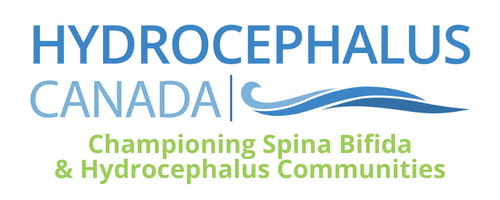
By: Mary Dufton
Since adolescence, Ingrid Exner has practised yoga for its many benefits. She now teaches it via Zoom to individuals with spina bifida and hydrocephalus so that they too can benefit from it. Being an adaptive yoga teacher gives Ingrid great joy. This is her story.
Ingrid was diagnosed with a brain tumour when she was only one and a half years old. When it was removed, her surgical team diagnosed her with hydrocephalus and inserted a shunt to drain the cerebral spinal fluid.
At age 12, Ingrid’s family doctor gave her a book called “Autobiography of a Yogi” and shared with her simple asanas (yoga postures) such as Cats and Cows. Her doctor knew that hydrocephalus would affect her emotions and that yoga might help.
“Throughout my appointments, my doctor would close his eyes and appear to meditate which calmed me. While I didn’t read the entire book, my doctor’s calming influence, stretches and calm nature through meditation all influenced me to investigate yoga. So, from that day forward, I did small and subtle stretches.
According to Ingrid, “Yoga involves awareness-building, becoming a witness to your body, breathing, and even becoming a witness to your pain. This is essential awareness building for anyone with a chronic and/or a life-threatening illness.
“We need to become aware of our pain to both treat and deal with it as well as to notice whether it is an indication of a shunt failure. Yoga also teaches us to be a witness to ourselves and our pain…not to be consumed by it. This is an essential lesson for people with hydrocephalus/spina bifida who may be dealing with pain daily.
“Lastly, yoga helps us to deepen our own natural breath which is essential learning for people who are dealing with pain and who often hold their breath because of their pain and trauma. And yoga teaches us to move in such ways that nourish the body, not hurt it.”
Now age 53, Ingrid lives in Burlington, Ontario. For over 20 years, she has been involved with Hydrocephalus Canada (formerly SBHAO) and had regular contact with the staff through attending support groups.
After she became a certified yoga teacher, she reached out to Hydrocephalus Canada staff to find out if there was an interest in developing a yoga program for individuals with spina bifida and/or hydrocephalus. The response was very positive and from there, on-line Zoom yoga classes began with Ingrid, facilitated by Hydrocephalus Canada. It was always Ingrid’s intention to develop programing for people like her who were less flexible, who did not have the same range of motion as the instructor and for people who could not do handstands nor be upside down.
She also wanted to make yoga accessible, available, attractive, and accommodating to those who really needed it for the breathwork, the calm, the centredness and the meditative qualities. It seemed like the perfect fit for individuals with spina bifida and hydrocephalus.
Although there are several benefits to yoga for those of us with spina bifida and or hydrocephalus, there are certain precautions. Ingrid advises people who have a shunt not to do headstands, or upside-down poses as this positioning could interrupt the flow of cerebral spinal fluid.
As a complication from hydrocephalus, Ingrid has had vison issues throughout her life. Several shunt malfunctions, if not surgically corrected, could have led to vision loss.
“Due to the effects of the hydrocephalus and damage to my eyes, my macula tore, and I ended up with a hole, which could have caused blindness.”
Other issues included white outs, black outs, and bilateral papilledema which all could have caused blindness.
“My lesson from this entire experience is that people with hydrocephalus (at all ages) need to have regular eye exams and keep eye health as a priority in their lives.”
Every day, Ingrid does light stretching, yoga and meditation (including breath work) to calm, centre herself and reduce stiffness in her neck and joints. She also does body awareness work (a body scan) to connect herself with any pain that she may have from hydrocephalus.
“Sometimes, it can be easy to overlook signs of tiredness, fatigue, eye change, diet changes, slight visual issues, etc. I am lucky that my lifestyle, diet, activity level and experience with hydrocephalus has resulted in my not having to take medication except when I have visual issues or experiencing shunt malfunction symptoms.”
“I love leading these online yoga classes. This is not your typical yoga class and shouldn’t be. Everyone has different challenges, but many of us face the same obstacles and health concerns.”
Ingrid takes many precautions when teaching her yoga class. She avoids doing many spinal movements and replaces them with relaxing forward folds and various arm movements.
She offers the following advice for anyone with spina bifida and/or hydrocephalus who would like to start yoga: “Doing deep belly breathing can calm and nurture us and even lead to a better quality of life by reducing pain.
“Whether you are a wheelchair or walker user, or have limited range of motion due to your condition, you can still have control over your life, your body, and your breath. You may have to do modifications in some of the poses.”
“Even as a yoga teacher, I have my good days and my bad days, I do modifications and accommodations when needed –which is most of the time — and that is okay. Modifications are part of injury prevention. I truly believe that yoga should be available to everyone.”
Ingrid believes the world is changing and she wants the world of yoga to change with it – to be inclusive of those of us with disabilities. Although videos now include some participants using wheelchairs, essentially, much of today’s yoga is still geared toward people with full mobility in chairs. Ingrid wants to change that.
Note: For more information on how to register for Ingrid’s online yoga classes, contact Shauna Beaudoin at Hydrocephalus Canada by email at: sbeaudoin@hydrocephalus.ca or by phone at: 1-800-387-1575.




